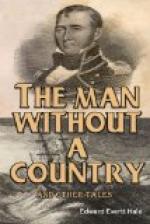The melody was triumphant; and the enthusiastic manner yet more so. The Philistines listened delighted,—too careless of religion, they, indeed not to be catholic in presence of religious enthusiasm; and Homer wore the exalted expression which his face seldom wore. For the first time since his childhood, Homer felt that he was not alone in the world!
Who shall venture to tell what passed between the two minstrels, when Homer, leaving his couch, crossed the circle at once, flung himself on the ground by David’s side, gave him his hand; when they looked each other in the face, and sank down into the rapid murmuring of talk, which constant gesture illustrated, but did not fully explain to the rough men around them? They respected the poets’ colloquy for a while; but then, eager again to hear one harp or the other, they persuaded one of the Ionian sailors to ask Homer again to sing to them.
It was hard to persuade Homer. He shook his head, and turned back to the soldier-poet.
“What should I sing?” he said.
They did not enter into his notion: hearers will not always. And so, taking his question literally, they replied, “Sing? Sing us of the snow-storm, the storm of stones, of which you sang at noon.”
Poor Homer! It was easier to do it than to be pressed to do it; and he struck his harp again:—
“It was as when, some
wintry day, to men
Jove would, in
might, his sharp artillery show;
He wills his winds to sleep,
and over plain
And mountains
pours, in countless flakes, his snow,
Deep it conceals the rocky
cliffs and hills,
Then covers all
the blooming meadows o’er,
All the rich monuments of
mortals’ skill,
All ports and
rocks that break the ocean-shore
Rock, haven, plain, are buried
by its fall;
But the near wave, unchanging,
drinks it all.
So while these stony tempests
veil the skies,
While this on Greeks, and
that on Trojans flies,
The walls unchanged above
the clamor rise."[B]
The men looked round upon David, whose expression, as he returned the glance, showed that he had enjoyed the fragment as well as they. But when they still looked expectant, he did not decline the unspoken invitation; but, taking Homer’s harp, sang, as if the words were familiar to him:—
“He giveth snow like
wool;
He scattereth the hoar-frost
like ashes;
He casteth forth his ice like
morsels;
Who can stand before his cold?
He sendeth forth his word,
and melteth them;
He causeth his wind to blow,
and the waters flow.”
“Always this ‘He,’” said one of the young soldiers to another.
“Yes,” he replied; “and it was so in the beginning of the evening, when we were above there.”
“There is a strange difference between the two men, though the one plays as well as the other, and the Greek speaks with quite as little foreign accent as the Jew, and their subjects are the same.”




